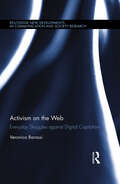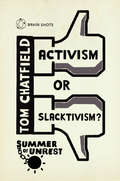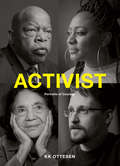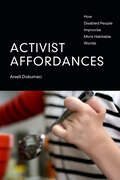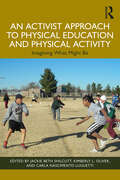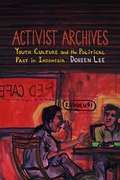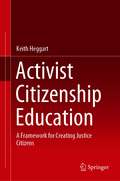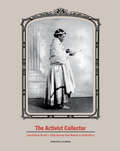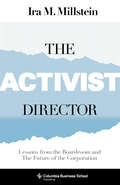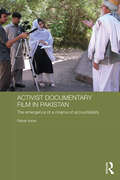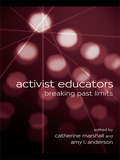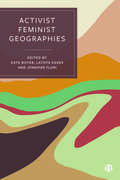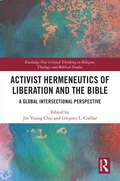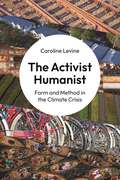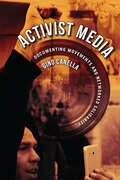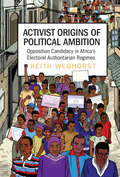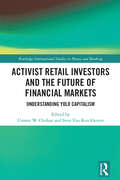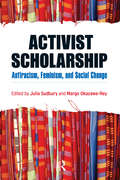- Table View
- List View
Activism on the Web: Everyday Struggles against Digital Capitalism (Routledge New Developments in Communication and Society Research)
by Veronica BarassiActivism on the Web examines the everyday tensions that political activists face as they come to terms with the increasingly commercialized nature of web technologies and sheds light on an important, yet under-investigated, dimension of the relationship between contemporary forms of social protest and internet technologies. Drawing on anthropological and ethnographic research amongst three very different political groups in the UK, Italy and Spain, the book argues that activists’ everyday internet uses are largely defined by processes of negotiation with digital capitalism. These processes of negotiation are giving rise to a series of collective experiences, which are defined by the tension between activists’ democratic needs on one side and the cultural processes reinforced by digital capitalism on the other. In looking at the encounter between activist cultures and digital capitalism, the book focuses in particular on the tension created by self-centered communication processes and networked-individualism, by corporate surveillance and data-mining, and by fast-capitalism and the temporality of immediacy. Activism on the Web suggests that if we want to understand how new technologies are affecting political participation and democratic processes, we should not focus on disruption and novelty, but we should instead explore the complex dialectics between digital discourses and digital practices; between the technical and the social; between the political economy of the web and its lived critique.
Activist: Portraits of Courage
by KK OttesenA speech on the radio. A high school literature class. A promise made to a mother.Activism begins in small ways and in unexpected places. In this inspiring book, over forty activists from Billie Jean King to Senator Bernie Sanders and Grover Norquist to Al Sharpton recount the experiences that sparked their journeys and share the beliefs that keep them going. These are citizens who met challenge with action. Their visions for peace, equality, and justice have reshaped American society—from voting to reproductive rights, and from the environment to the economy.• Brings together multiple generations from different (sometimes opposite perspectives)• Features KK Ottesen's luminous photographs revealing passion, purpose and optimism• Powerful narratives that collective remind us that anyone can take the future into their own handsFans of 1960Now, Martha Rosler: Irrespective, and Charles White: A Retrospective will love this book. This book is perfect for:• Activists, old and new• Politically engaged readers • Photography fans• Millennials
Activist Affordances: How Disabled People Improvise More Habitable Worlds
by Arseli DokumaciFor people who are living with disability, including various forms of chronic diseases and chronic pain, daily tasks like lifting a glass of water or taking off clothes can be difficult if not impossible. In Activist Affordances, Arseli Dokumacı draws on ethnographic work with differently disabled people whose ingenuity, labor, and artfulness allow them to achieve these seemingly simple tasks. Dokumacı shows how they use improvisation to imagine and bring into being more habitable worlds through the smallest of actions and the most fleeting of movements---what she calls “activist affordances.” Even as an environment shrinks to a set of constraints rather than opportunities, the improvisatory space of performance opens up to allow disabled people to imagine that same environment otherwise. Dokumacı shows how disabled people’s activist affordances present the potential for a more liveable and accessible world for all of us.
An Activist Approach: Castle Rock-Fultons-Remingtons
by Kaitlyn Szydlowski Guhan SubramanianA three party, multiple-issue negotiation exercise dealing with a potential merger between two leading department stores, called for by an activist investor hedge fund in a letter to both companies. Company management will now attempt to navigate next moves, which are complicated by weak takeover defenses of their corporate boards, hedge fund ownership stake within both companies, and potential anti-trust risk. Meanwhile, the third party, the activist hedge fund, is turning up the heat in planning their next move.
An Activist Approach: Confidential Role Assignment for Castle Rock Management
by Kaitlyn Szydlowski Guhan SubramanianA three party, multiple-issue negotiation exercise dealing with a potential merger between two leading department stores, called for by an activist investor hedge fund in a letter to both companies. Company management will now attempt to navigate next moves, which are complicated by weak takeover defenses of their corporate boards, hedge fund ownership stake within both companies, and potential anti-trust risk. Meanwhile, the third party, the activist hedge fund, is turning up the heat in planning their next move.
An Activist Approach: Confidential Role Assignment for Fultons Department Stores
by Kaitlyn Szydlowski Guhan SubramanianA three party, multiple-issue negotiation exercise dealing with a potential merger between two leading department stores, called for by an activist investor hedge fund in a letter to both companies. Company management will now attempt to navigate next moves, which are complicated by weak takeover defenses of their corporate boards, hedge fund ownership stake within both companies, and potential anti-trust risk. Meanwhile, the third party, the activist hedge fund, is turning up the heat in planning their next move.
An Activist Approach: Confidential Role Assignment for Remingtons Housewares
by Kaitlyn Szydlowski Guhan SubramanianA three party, multiple-issue negotiation exercise dealing with a potential merger between two leading department stores, called for by an activist investor hedge fund in a letter to both companies. Company management will now attempt to navigate next moves, which are complicated by weak takeover defenses of their corporate boards, hedge fund ownership stake within both companies, and potential anti-trust risk. Meanwhile, the third party, the activist hedge fund, is turning up the heat in planning their next move.
An Activist Approach: Castle Rock-Fultons-Remingtons
by Guhan Subramanian Kaitlyn SzydlowskiA three party, multiple-issue negotiation exercise dealing with a potential merger between two leading department stores, called for by an activist investor hedge fund in a letter to both companies. Company management will now attempt to navigate next moves, which are complicated by weak takeover defenses of their corporate boards, hedge fund ownership stake within both companies, and potential anti-trust risk. Meanwhile, the third party, the activist hedge fund, is turning up the heat in planning their next move.
An Activist Approach: Confidential Role Assignment for Castle Rock Management
by Guhan Subramanian Kaitlyn SzydlowskiA three party, multiple-issue negotiation exercise dealing with a potential merger between two leading department stores, called for by an activist investor hedge fund in a letter to both companies. Company management will now attempt to navigate next moves, which are complicated by weak takeover defenses of their corporate boards, hedge fund ownership stake within both companies, and potential anti-trust risk. Meanwhile, the third party, the activist hedge fund, is turning up the heat in planning their next move.
An Activist Approach: Confidential Role Assignment for Fultons Department Stores
by Guhan Subramanian Kaitlyn SzydlowskiA three party, multiple-issue negotiation exercise dealing with a potential merger between two leading department stores, called for by an activist investor hedge fund in a letter to both companies. Company management will now attempt to navigate next moves, which are complicated by weak takeover defenses of their corporate boards, hedge fund ownership stake within both companies, and potential anti-trust risk. Meanwhile, the third party, the activist hedge fund, is turning up the heat in planning their next move.
An Activist Approach to Physical Education and Physical Activity: Imagining What Might Be
by Jackie Beth Shilcutt Kimberly L. Oliver Carla Nascimento LuguettiThis timely and diverse collection offers perspectives on engaging people in physical activity utilizing the Activist Approach. This approach facilitates interest, motivation, and learning in physical education by focusing on student-centered pedagogy, embodiment, inquiry-based education, and listening and responding to students over time. The resource collates experts and beginners who have used the Activist Approach to incorporate participants’ interests, motivation, and learning needs and maintain student voices in physical activity environments. Chapters center around three broad areas of the Activist Approach: 1) physical education settings, 2) physical activity settings, and 3) teachers’ experiences of learning to use an Activist Approach in physical education and physical activity. Contributors from around the world discuss challenges and benefits experienced, issues of equity and justice and what people gained and gave up by using the approach. Focusing on key areas in physical education settings, dance, sport, and physical activity settings, and PE teacher education and professional development, this book offers crucial, critical perspectives on how to meet people’s physical activity needs.
Activist Archives: Youth Culture and the Political Past in Indonesia
by Doreen LeeIn Activist Archives Doreen Lee tells the origins, experiences, and legacy of the radical Indonesian student movement that helped end the thirty-two-year dictatorship in May 1998. Lee situates the revolt as the most recent manifestation of student activists claiming a political and historical inheritance passed down by earlier generations of politicized youth. Combining historical and ethnographic analysis of "Generation 98," Lee offers rich depictions of the generational structures, nationalist sentiments, and organizational and private spaces that bound these activists together. She examines the ways the movement shaped new and youthful ways of looking, seeing, and being--found in archival documents from the 1980s and 1990s; the connections between politics and place; narratives of state violence; activists' experimental lifestyles; and the uneven development of democratic politics on and off the street. Lee illuminates how the interaction between official history, collective memory, and performance came to define youth citizenship and resistance in Indonesia's transition to the post-Suharto present.
Activist Citizenship Education: A Framework for Creating Justice Citizens
by Keith HeggartThis book explores alternative models of civics and citizenship education. Specifically, it uses Justice Citizens, a participatory research and film-making project, as a tool to examine young people’s ideas about active citizenship and participation in public spaces. It introduces a framework that seeks to explore the diverse and apparently contradictory nature of young people’s active citizenship. The framework draws on complexity theory combined with critical pedagogy and democratic education to formulate an approach to developing active citizenship among young people. This approach extends theories of both critical pedagogy and education for citizenship, and by doing so seeks to explain the variegated nature of young people’s engagement with civil society. This book contains a valuable repository of ideas and resources for application for teachers to use in schools and classrooms. Academics engaged in initial teacher education, at both primary and secondary levels, will find the framework of use when describing the importance and new approaches to civics and citizenship education within the current school and policy environments.
The Activist Collector: Lida Clanton Broner’s 1938 Journey from Newark to South Africa
by Christa Clarke“After twenty-eight years of desire and determination, I have visited Africa, the land of my forefathers.” So wrote Lida Clanton Broner (1895–1982), an African American housekeeper and hairstylist from Newark, New Jersey, upon her return from an extraordinary nine-month journey to South Africa in 1938. This epic trip was motivated not only by Broner’s sense of ancestral heritage, but also a grassroots resolve to connect the socio-political concerns of African Americans with those of black South Africans under the segregationist policies of the time. During her travels, this woman of modest means circulated among South Africa’s Black intellectual elite, including many leaders of South Africa’s freedom struggle. Her lectures at Black schools on “race consciousness and race pride” had a decidedly political bent, even as she was presented as an “American beauty specialist.” How did Broner—a working class mother—come to be a globally connected activist? What were her experiences as an African American woman in segregated South Africa and how did she further her work after her return? Broner’s remarkable story is the subject of this book, which draws upon a deep visual and documentary record now held in the collection of the Newark Museum of Art. This extraordinary archive includes more than one hundred and fifty objects, ranging from beadwork and pottery to mission school crafts, acquired by Broner in South Africa, along with her diary, correspondence, scrapbooks, and hundreds of photographs with handwritten notations. Published by the Newark Museum. Distributed worldwide by Rutgers University Press.
The Activist Director: Lessons from the Boardroom and the Future of the Corporation (Columbia Business School Publishing Ser.)
by Ira MillsteinSome of the worst corporate meltdowns over the past sixty years can be traced to passive directors who favored operational shortcuts over quality growth strategies. Thinking primarily about placating institutional investors, selective stockholders, proxy advisors, and corporate management, these inattentive and deferential board members have relied on short-term share price increases to sustain their companies long term. Driven by a desire for prosperity, not posterity, these actions can doom any company. In The Activist Director, attorney Ira M. Millstein looks back at fifty years of counseling companies, nonprofits, and governments to actively govern their corporations and constituencies. From the threat of bankruptcy and the ConEd blackout of 1970s New York City, to the meltdown of Drexel Burnham Lambert in the late 1980s, to the turnaround of General Motors in the mid-1990s, Millstein takes readers into the boardrooms of several of the greatest catastrophes and success stories of America's best-known corporations. His solution lies at the top: a new breed of activist directors who partner with management and reject short-term outlooks, plan a future based on growth and innovation, and take responsibility for corporate organization, strategy, and efficiency. What questions should we ask of potential board members and how do we know they'll be active? Millstein offers pragmatic suggestions for recruiting activist directors to the boardroom to secure the future of the corporation.
Activist Documentary Film in Pakistan: The Emergence of a Cinema of Accountability (Routledge Contemporary South Asia Series)
by Rahat ImranThis book, the first academic book on Pakistani documentary cinema, traces the development of activist filmmaking practices in Pakistan which have emerged as a response to the consequences of religious fundamentalism, extremism, and violation of human rights. Beginning with the period of General Zia-ul-Haq’s Islamization process (1977-88), it discusses a selection of representative documentary films that have critically addressed and documented the various key transformations, events, and developments that have shaped Pakistan’s socio-political, socio-economic, and cultural history. Such activist filmmaking practice in Pakistan is today an influential factor in addressing the politics, and negative and oppressive effects of the Islamization era, discriminatory laws, particularly gender-discriminatory Sharia laws, violation of human and citizen rights, authoritarianism, internal strife, the spread of religious fundamentalism, and the threat of Talibanization, and oppressive tribal customs and traditions. The contribution of Pakistani documentary filmmakers stands as a significant body of work that has served the cause of human rights, promoting awareness and social change in Pakistan, particularly regarding gender rights.
Activist Educators: Breaking Past Limits (Teaching/Learning Social Justice)
by Catherine Marshall Amy L. AndersonTaking an active stand in today's conservative educational climate can be a risky business. Given both the expectations of the profession and the challenge of participation in social justice activism, how do educator activists manage the often competing demands of professional and activist commitments? Activist Educators offers a view into the big picture of assertive idealistic professionals’ lives by presenting rich qualitative data on the impetus behind educators’ activism and the strategies they used to push limits in fighting for a cause. Chapters follow the stories of educator activists as they take on problems in schools, including sexual harassment, sexism, racism, reproductive rights, and GLBT rights. The research in Activist Educators contributes to an understanding of professional and personal motivations for educators’ activism, ultimately offering a significant contribution to aspiring teachers who need to know that education careers and social justice activist causes need not be mutually exclusive pursuits.
Activist Feminist Geographies
by Kate Boyer, LaToya E. Eaves, and Jennifer FluriExploring what it means to enact feminist geography, this book brings together contemporary, cutting-edge cases of social justice activism and collaborative research with activists. From Black feminist organizing in the American South to the stories of feminist geography collectives in Latin America, the editors present contemporary case studies from the global north and south. The chapters showcase the strength and vibrancy of activist-engaged scholarship taking place in the field and serve as a call to action, exploring how this work advances real-world efforts to fight injustice and re-make the world as a fairer, more equitable, and more accepting place.
Activist Hermeneutics of Liberation and the Bible: A Global Intersectional Perspective (Routledge New Critical Thinking in Religion, Theology and Biblical Studies)
by Jin Young Choi Gregory L. CuéllarInspired by the current political moment around the globe in which uprisings, protests, revolutions, and movements are on the rise, this book examines the intersections between the Bible and activism. It does this by showcasing intersectional readings of the Bible as an activist act and a tool for activism; historicizing the uses of the Bible within activist/freedom movements around the globe; and offering activist approaches to teaching the Bible.Each chapter in this volume provides a critical and substantive response from the discipline of Biblical Studies to global political trends. International in scope, with contributors from Africa, Asia, Caribbean, Europe, Latin America, Oceania and the United States, they address themes such as gender politics, racial injustices, violence toward women, political resistance, and activist hermeneutics and pedagogies. Together they harness the intellectual energies of minoritized Biblical scholars in a nonessentialist manner to reflect on the Bible as a tool for liberating social and political change. Reflecting on the activist potential of the Bible, this book will be of keen interest to scholars in Biblical Studies, Political Theology, and Religious Studies.
The Activist Humanist: Form and Method in the Climate Crisis
by Caroline LevineAn argument that humanists have the tools—and the responsibility—to mobilize political power to tackle climate changeAs climate catastrophes intensify, why do literary and cultural studies scholars so often remain committed to the separation of aesthetic study from the nitty-gritty of political change? In this thought-provoking book, Caroline Levine makes the case for an alternative view, arguing that humanists have the tools to mobilize political power—and the responsibility to use those tools to avert the worst impacts of global warming. Building on the theory developed in her award-winning book, Forms, Levine shows how formalist methods can be used in the fight for climate justice.Countering scholars in the environmental humanities who embrace only “modest gestures of care”—and who seem to have moved directly to “mourning” our inevitable environmental losses—Levine argues that large-scale, practical environmental activism should be integral to humanists’ work. She identifies three major infrastructural forms crucial to sustaining collective life: routines, pathways, and enclosures. Crisscrossing between art works and public works—from urban transportation to television series and from food security programs to rhyming couplets—she considers which forms might support stability and predictability in the face of growing precarity. Finally, bridging the gap between academic and practical work, Levine offers a series of questions and exercises intended to guide readers into political action. The Activist Humanist provides an essential handbook for prospective activist-scholars.
Activist Media: Documenting Movements and Networked Solidarity
by Gino CanellaNow more than ever, activists are using media to document injustice and promote social and political change. Yet with so many media platforms available, activists sometimes fail to have a coherent media and communication strategy. Drawing from his experiences as a documentary filmmaker with Black Lives Matter 5280 and Service Employees International Union (SEIU) Local 105 in Denver, Colorado, Gino Canella argues that activist media create opportunities for activists to navigate conflict and embrace their political and ideological differences. Canella details how activist media practices—interviewing organizers, script writing, video editing, posting on social media, and hosting community screenings—foster solidarity among grassroots organizers. Informed by media theory, this book explores how activists are using media to mobilize supporters, communicate their values, and reject anti-union rhetoric. Furthermore, it demonstrates how collaborative media projects can help activists build broad-based coalitions and amplify their vision for a more equitable and just society.
Activist Origins of Political Ambition: Opposition Candidacy in Africa's Electoral Authoritarian Regimes
by Keith WeghorstWhy do people run for office with opposition parties in electoral authoritarian regimes, where the risks of running are high, and the chances of victory are bleak? In Activist Origins of Political Ambition, Keith Weghorst offers a theory that candidacy decisions are set in motion in early life events and that civic activism experiences and careers in civil society organizations funnel aspirants towards opposition candidacy in electoral authoritarian regimes. The book also adapts existing explanations of candidacy decisions derived from leading democracies that can be applied to electoral authoritarian contexts. The mixed-methods research design features an in-depth study of Tanzania using original survey data, sequence methods, archival research, and qualitative data combined with an analysis of legislators across authoritarian and democratic regimes in Africa. A first-of-its kind study, the book's account of the origins of candidacy motivations offers contributions to its study in autocracies, as well as in leading democracies and the United States.
Activist Retail Investors and the Future of Financial Markets: Understanding YOLO Capitalism (Routledge International Studies in Money and Banking)
by Usman W. Chohan Sven Van KerckhovenContemporary financial markets have been characterized by sociocultural phenomena such as "meme stocks", the Gamestop short squeeze, and "You Only Live Once (YOLO) trading". These are movements led by small-scale retail investors banding together to participate forcefully in financial markets through decentralized but coordinated actions. This book deploys many different subdisciplines to explore the recent ‘power grabbing’ of retail investors and the online environment that enables them to join the ranks of major financial players, and participate in contemporary capitalism. It offers multiple perspectives on the genesis, role, motivations, power, and future prospects of retail investors as a force in contemporary financial markets. Drawing upon the insights of authors hailing from many different countries, the book frames YOLO capitalism through numerous angles that help to explain the context and the importance of activist retail investors in modern financial markets, and thereby explore the possibilities of a transformed financial future with much wider small-scale participation. The book assesses the potential of online - and other - communities in enabling global coordination in impacting or even driving financial and crypto markets, and the challenges that come with it and weighs the competing narratives both positive and negative regarding YOLO capitalism. It strikes a balanced assessment of their legal, cultural, behavioural, economic, and political roles in modern finance. This book will be of interest to a multidisciplinary and interdisciplinary audience of scholars in financial markets, financial regulation, political economy, public administration, macroeconomics, corporate governance, and the philosophy and the sociology of finance.
Activist Scholarship: Antiracism, Feminism, and Social Change
by Julia Sudbury Margo Okazawa-ReyCan scholars generate knowledge and pedagogies that bolster local and global forms of resistance to U.S. imperialism, racial/gender oppression, and the economic violence of capitalist globalization? This book explores what happens when scholars create active engagements between the academy and communities of resistance. In so doing, it suggests a new direction for antiracist and feminist scholarship, rejecting models of academic radicalism that remain unaccountable to grassroots social movements. The authors explore the community and the academy as interlinked sites of struggle. This book provides models and the opportunity for critical reflection for students and faculty as they struggle to align their commitments to social justice with their roles in the academy. At the same time, they explore the tensions and challenges of engaging in such contested work.
